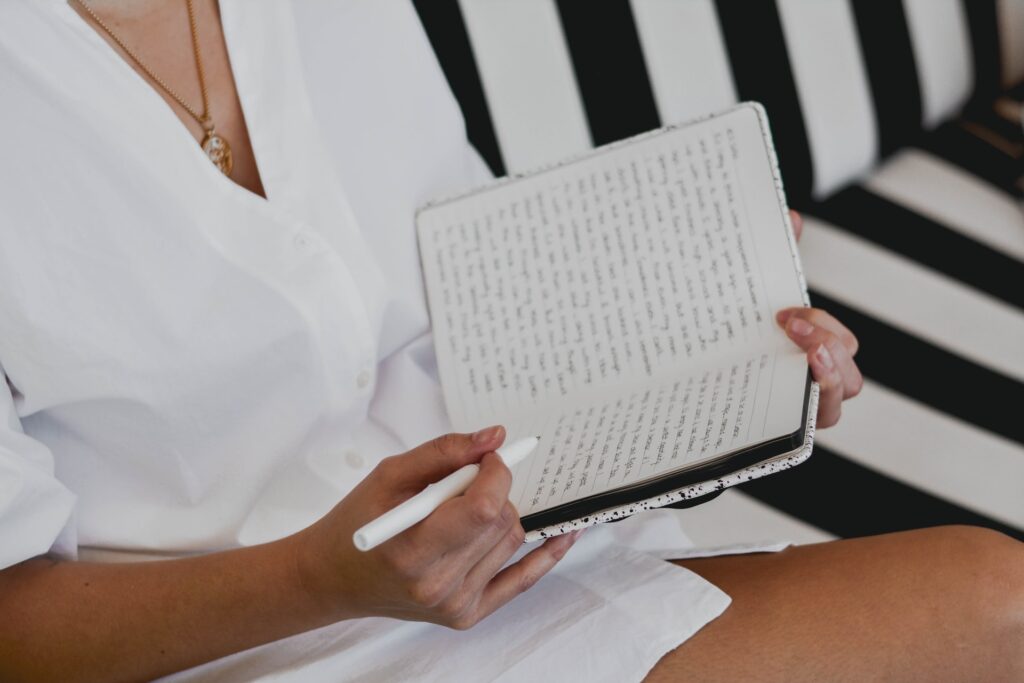Ever feel like you’re scatter brained? Or lost in thought, unsure what to make of them all? Not sure how best spend your time or organize your life’s details and events?
Journaling is for you!
It has more benefits than can be counted on two hands.
Some of the greatest minds in history have been avid journalers: Abraham Lincoln, Isaac Newton, Benjamin Franklin, Leonardi di Vinci, Maya Angelou, Winston Churchill – and we’re just getting started.
Jim Rohn once said, “If you’re serious about becoming a wealthy, powerful, sophisticated, healthy, influential, cultured, or a unique individual, keep a journal.”
It will help clear out the clutter from that cluttered mind, provide direction when circumstance seems bewildering; create visions for future dreams which are achievable with a bit of hard work; offer insight into why we do things as they happen (rather than just saying “I don’t know”) while simultaneously giving us an outlet so our emotions won’t bury themselves within us until we erupt at someone close-by over something minor…and then regretting every word said thereafter… Oh just me?
If you resonate with any of this at all, we want to help you get started journaling.
In this complete guide, we’ll cover the basics of journaling, the benefits of journaling, how to journal, the different types of journaling, how to get started, how to choose a journal, and a lot more.
Get excited for your journaling journey!
The Benefits of Journaling
There are countless benefits to journaling – we’ve already covered a few above, but want to walk you through a few more. Here are some of the biggest.
Journaling clears your mind. Whether it’s from a bad day, or just to take some time for yourself in the middle of a busy week, journaling is an excellent way to get things out and create space for new thoughts and ideas – not to mention it provides many spiritual benefits as well.
Journaling reduces stress and anxiety. Multiple studies have shown journaling regularly can have a direct impact on your mood as well as reduce stress.
Journaling helps you get organized by making us aware of what needs to get accomplished in a given day or week, by putting thoughts into logical order, or by turning a mess of to-dos into an organized list.
Journaling makes you more disciplined. Once it becomes a habit, you may find that journaling helps to keep your thoughts organized and on track. Journaling for self improvement is a great reason and benefit.
Journaling makes you more creative. The act of writing something down often sparks new ideas or perspectives, which in turn provide a jump start for our imagination.
Judy Willis MD, a neurologist, and former classroom teacher explains, “The practice of writing can enhance the brain’s intake, processing, retaining, and retrieving of information… it promotes the brain’s attentive focus … boosts long-term memory, illuminates patterns, gives the brain time for reflection, and when well-guided, is a source of conceptual development and stimulus of the brain’s highest cognition.”
How to Journal 101: Getting Started
Step One: The what. Think of a topic to write about. This can be anything that’s on your mind, such as an event in the day, strong feelings you’re experiencing, or something from a dream. The key is to start writing and not worry if nothing comes out right away.
We’ll talk about a few types of journaling below, but here are some tips for starters;
- Use a journaling prompt! There are plenty of guided journals out there to help guide your journaling – but you can also just Google “journaling prompts” for starters.
- Start with a list of things you’re grateful for. Gratitude journaling is a specific type of journaling that will change your perspective.
- Go with stream of consciousness. Just start writing. Don’t worry about form. Don’t even worry if you’re forming complete sentences. Just go for it.
Step Two: The where. Find a space that’s comfortable for you – trust us, this will make a big difference. If it helps, try setting up your journaling area the way you would set up your favorite reading spot. You might want to have some water or tea at hand for when inspiration strikes.
Set yourself up in an environment where you can concentrate on what comes out of your mind without distraction so as not to worry about how well written things are going.
- Create a “Journaling Space”. This may be different depending on whether you’re writing by hand or typing with a laptop – but either way, make sure there is no one around who will distract you from thinking freely. For example- if sitting down and writing by hand, find a place away from TV’s
- Try getting out of your comfort zone. Sometimes we need new stigma for fresh inspiration. Try going to the park, the zoo, a coffee shop, or hanging up a hammock outside.
Step Three: Start Writing. Just get started! Don’t overthink it.
- Writing can be hard. Sometimes you may find yourself stuck and staring at a blank page, with no words coming to mind. This is natural! You will eventually get back into the swing of things- just take deep breaths and try again
- Take it one day at a time. Be realistic about how long your journaling session should last – so that if you only have 15 minutes before dinner or work starts, don’t expect too much from yourself in those short few minutes
- Get creative! There are many ways to express oneself besides writing out thoughts on paper: drawing, painting pictures; making collages; going for a jog through nature without any music playing; etc.
The Different Types of Journaling
There are many different methods and approaches to journaling. Let’s briefly review some of them.
Stream of Consciousness Journaling
This is simply when you start writing with little agenda. Stream of consciousness journaling is a great way to empty your mind, record different events, start to make sense of your thoughts, and become more mindful.
Gratitude Journaling
Gratitude journaling is a type of guided journaling, focused specifically on building gratitude. It’s the process of simply writing down what you are grateful for. It can be done on a daily or as-needed basis, and it can take many forms.
Bullet Journaling
Bullet journaling is a very specific type of journaling, meant primarily to keep you organized and mindful in the most efficient way possible. It follows a fairly strict system that makes journaling super efficient. Also note: bullet journaling can also refer to buying a bulleted journal and using it creatively. Think: sweet art on every page.
Guided Journaling
Guided journaling involves using prompts or using prompted journals to answer different questions, reflect, plan, dream, and more. As mentioned already, you can get a specific guided journal or simply look up prompts online. We have a post dedicated specifically to mental health journal prompts.
Theme/Project Based Journaling
If you want to delve more deeply into a specific topic or focus from day-to-day, then this may be for you. For example, you want to further explore the idea of joy. Each day you would journal on that topic, what you’re learning, how you’re experiencing it, and more.
Visual Journal/Artistic Journal
This type of journal involves creating art through drawing or collages which often includes painting as well. The act of making something out of nothing – from scratch with your own two hands – is an incredibly useful tool that often provides the same benefits as if you wrote each day.
Memoir Journaling
This type of journaling is about writing a memoir or some form of personal historical account. It can be done in the same way as any other kind, but with a focus on telling your story and memory for posterity. This might also come from a place where you want to work through something emotionally difficult by talking it out onto paper first before sharing it with anyone else. Memoir journaling is probably the closest thing to keeping a diary.
Choosing the Best Journal for You
There are a lot of different types of journals to choose from, and they each have their own benefits.
1. Decide what kind of journaling you want to do
Use the above list. If you want to do more open-ended, bullet, or creative journaling, you should pick a blank journal.
If you want some guidance, choose a guided journal with prompts.
If you’re looking to grow in gratitude, find a guided gratitude journal.
2. Establish your price range
You might not realize it, but you can drop some serious dollars on a journal if you want to. If you don’t want to spend $30, just find a simple journal.
3. Know what sets journals apart
If you are okay spending $20+ on a journal, you need to know what makes journals premium (or not so premium).
- Page Weight: This is an important factor to make sure your pen doesn’t bleed through the pages. Page weight is measured in gsm (grams per square meter). 140gsm is about as thick as they get, while 60gsm is a fairly thin piece of paper.
- Type of Paper: Some journals use a newsprint paper that can be difficult to write on with pen (and some people might find it distracting) and other papers have the feel of being more high quality.
- Cover Material: Does the cover material suit your style? Is leather too formal for you or do you want something softer like faux suede?
- Journal Size: Journals come in all sorts of shapes, sizes, color schemes, and bindings so if size is important to you make sure what kind suits your needs best.
Now if you’re looking for a guided journal, the above is important, but probably not as important as the quality of the prompts and guidance. Here are some things to look for:
- Type of Prompts: Some journals use the same prompts everyday while others mix it up. It’s all about your preference.
- Inspiration: Some of these guided journals contain daily inspiration and challenges to help you out while others leave you and brain to yourselves.
- Themes: Different journals have different themes. Just consider your journaling goals. If you want to become more creative, look for creative journals. If you want to improve in discipline, look for a journal with challenging prompts.
4. Read those reviews
We’re reviewed a number of journals on this site, but you can also benefit greatly from Amazon. If it has more than 100 reviews, it’s bound to have a ton of super helpful information about your journal. Don’t click the buy button without reading a few reviews.
Tips on Getting Started with Journaling
Before you head out on your journaling adventure, we wanted to leave you with some last minute tips for getting the most out of journaling:
- Journal Consistently. Don’t give up after a few days. You need to give it time before you start seeing benefits.
- Start Small. Don’t set a huge goal of journaling everyday for the next year. I believe in you! But perhaps start by trying for just a few times per week.
- Track Your Habit. Keep track of all the days you journal and build some momentum. You can check out an app or just use pen and paper to keep track.
- Keep It Real! Journal about what’s going on in life right now. This will help with perspective building – which we’ll get into more detail below – and build up a record of how your day went from start to finish that could be helpful if you’re trying to remember specific events later down the line.
- Don’t Be Afraid to Switch it Up. If bullet journaling isn’t going well for you – ditch it and try creative journaling or pick up a guided journal with prompts. If you’re not seeing results from one type of journaling it could just mean that you need something different.
- Don’t Let Yourself Get Distracted. When doing creative writing in your journal as part of expressive arts therapy or introspection – give yourself complete freedom to do whatever pops into your head without worrying about how silly or weird it might seem. Write down everything!
- Get Some Accountability. Tell someone you’re trying to make a habit of journaling and have them check in on you regularly.
- Keep it Simple. It’s easy to feel pressured in this digital world of perfect pictures and polished writing, but whenever you start journaling – just write your thoughts on paper or a computer without any pressure whatsoever.
- Be Kind to Yourself. Let go of perfectionism and give yourself permission to be imperfect with your words!
- Write for Your Eyes Only. Many people get caught up thinking, “What if someone else read this?” Don’t fall into that trap. It’s okay to be real, honest, and messy. Don’t worry too much about grammar or structure.
- Just Get Started. Journaling doesn’t have to take up an hour everyday and it doesn’t have to be a huge deal. Just get started and make some space where the only thing between you and what you’re trying to express is blank pages.
If you’ve never tried journaling before, I can understand why it might seem like a daunting task. But there are so many benefits that come with writing about your thoughts and feelings!
There is no right or wrong way when it comes to journaling, but finding the type that resonates most with you will make all the difference in how successful this new habit becomes for you.
Got any questions? I’d love to hear from you below!





